You're a proud vacation rental host in High Point, North Carolina. Guests love your charming property, and bookings are rolling in steadily. Then, one rainy weekend, disaster strikes. A burst pipe floods the living room just hours before your next guest is due to arrive. Panic sets in-how much will this cost to repair? Will you have to cancel the booking? Can you cover the lost income?
This is where understanding your vacation rental insurance coverage becomes essential.
Read on to learn all about vacation rental insurance coverage.
What Is Vacation Rental Property Insurance?
Vacation rental property insurance is a specialized form of coverage meant to address the particular risks associated with short-term rental properties. Unlike traditional homeowners insurance, which primarily covers personal use of a home, or landlord insurance, which focuses on long-term tenants, vacation rental insurance is tailored specifically for properties rented out to guests on a short-term basis.
This type of vacation home coverage policy combines elements of homeowners and landlord insurance while adding protection against risks unique to vacation rentals. It covers scenarios like:
- Guest injuries
- Accidental property damage caused by guests
- Income loss if your property becomes uninhabitable due to a covered event
It often includes coverage for theft or vandalism that occurs during a guest's stay, which is typically excluded from standard insurance policies.
Factors to Consider When Choosing Insurance for Airbnb Hosts
When selecting holiday home insurance for your property in High Point, North Carolina, it's essential to evaluate your needs and the unique risks associated with short-term rentals.
How often you rent out your property significantly impacts the type of coverage you need. If your vacation rental is booked year-round, you may require a more robust policy compared to properties rented only occasionally. Frequent rentals typically involve increased foot traffic and higher risks, making comprehensive coverage essential.
If your vacation rental is a significant source of passive income, consider policies that include loss-of-use coverage. This will reimburse you for lost rental income if your property becomes uninhabitable due to a covered event, such as a fire or severe storm.
Tips for Lowering Your Premium
With advance measures, you can lower your costs while still protecting your property and your investment.
Adding safety features to your vacation rental can significantly reduce insurance risks and, in turn, your premium. Install:
- Smoke detectors
- Fire extinguishers
- Carbon monoxide detectors
- A security system
If your property has high-risk amenities like a pool, adding a fence, locked gate, or safety cover can also lower liability risks and associated costs.
Reassess your insurance needs annually and shop around for better rates. If your property usage changes, notify your insurer to see if you qualify for a reduced premium.
Property managers can also be beneficial. They can help make sure your property stays in top shape and give you advice for keeping your vacation home coverage premium low.
Vacation Rental Insurance Coverage: Start Today
Vacation rental insurance coverage in South Carolina can be hard to manage. Hopefully, you now have enough information to protect yourself.
Do you want to hire help with short-term rental protection? PMI Piedmont is part of a franchise dedicated to ensuring investors like you succeed, and we've got decades of experience to prove it.
Contact us today to get started.


